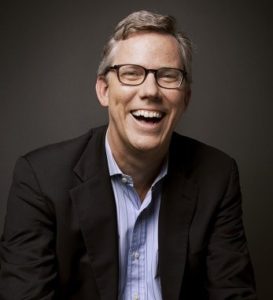Brian Halligan, the CEO of inbound marketing and sales software company HubSpot, successfully scaled a small startup into a leading, multi-billion-dollar tech behemoth. Having learned a bit along the way, Halligan has become a popular writer and lecturer, crediting his accomplishments to unlikely characters such as the band members of the Grateful Dead. The 49-year-old executive has been happy to share his insights in genuine efforts to help other entrepreneurs and leaders best navigate their organizations from seed to scale.
Born and raised in Westwood, Massachusetts, Halligan went through the U.S. public school system before graduating with a Bachelor of Science degree in Electrical Engineering from the University of Vermont. He began his career at Parametric Technology Corporation, only to leave in efforts to work at a smaller firm. Halligan served as VP of sales at Groove Networks for four years before it was sold to Microsoft and rebranded as Microsoft SharePoint Workspace. He went on to receive his MBA from MIT’s Sloan School of Management in 2005, and spent a brief time as a venture partner at Longworth Ventures before co-founding HubSpot in 2006.
As the leader of a $2.64 billion company, Halligan emphasizes the importance of embracing a culture of healthy debate, in which people rally around a decision – whether they advocate for it or not.
“As CEO, it’s your job to make the right decision, not the most popular decision. There have been plenty of times during HubSpot’s scale-up period that I’ve left a meeting with some disappointed managers; I feel it as soon as I step out of the room. But uninspired compromises feel much worse. Once decisions are made, it’s important to communicate them clearly to the rest of your team,” wrote Halligan in a blog post for the Harvard Business Review.
The CEO’s first book, titled Inbound Marketing and co-authored by HubSpot co-founder Dharmesh Shah, speaks to the next generation of marketing in which organizations must provide information that is useful to prospects. After seeing a fundamental weakness in traditional emails, cold calls and ads, HubSpot’s co-founders realized that people are simply sick and tired of being marketed to, and have become quite good at blocking it out. Instead, they assert that the future of marketing revolves around quality content, complimented with a sharp contextual intelligence. In such a way, content works to reel customers in, wherein context helps them relate, engage and follow through with their commitment.
“Marketing success today is more about the width of your brain than the width of your wallet,” Halligan once tweeted.
The software CEO also emphasizes the importance of market segmentation and personalization as a means for companies to convert prospects to long-term high value customers. He warns against CMOs getting too carried away with automation, suggesting that the most successful marketers will come off as authentic and human, as opposed to reverting to “creepier” strategies such as email list buying and spamming.
“The real tear in the fabric of the marketing universe is when people go beyond marketing automation in email and create content, get active in social and get good at SEO,” said Halligan, who urges CEOs to get out on social media and on platforms such as Twitter.
Earlier this year, the software industry exec spent a whopping $1.9 million for a guitar previously owned by the Grateful Dead’s late Jerry Garcia at a charity event. Jerry’s “Wolf” guitar, first debuted at a 1973 performance in front of the Hell’s Angels, is a prized relic of the legendary band and the group’s frontman.
Halligan’s guitar purchase was nothing close to a whim decision. He has attended about 100 shows of the Grateful Dead and the band that reformed after Garcia died in 1995. The tech executive channeled the teachings of his favorite band in his book titled “Marketing Lessons from the Grateful Dead: What Every Business Can Learn from the Most Iconic Band in History,” in which he applauds the group’s signature approach of making every concert a little different and welcoming their fans to record performances and distribute tapes for free.
The CEO admires the Grateful Dead for their disruption of the norm, calling them “the original social media marketers before there was social media.” Halligan learned from the Dead as they “turned the model of the music business back then on its head,” finding inspiration for his modern marketing business and propelling his career to new heights.
In regards to Wolf, Halligan promises, “I’m never going to sell it. It’s going to be with me the rest of my life.”
























